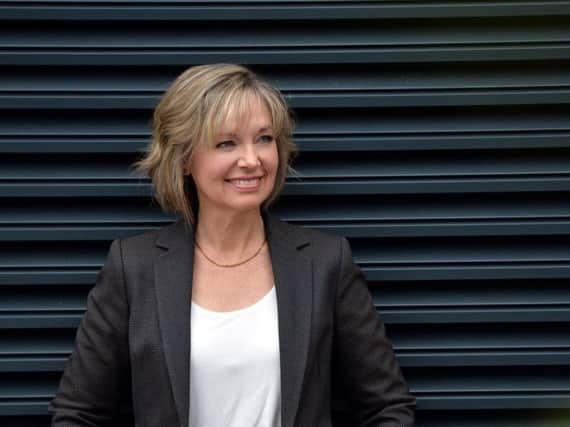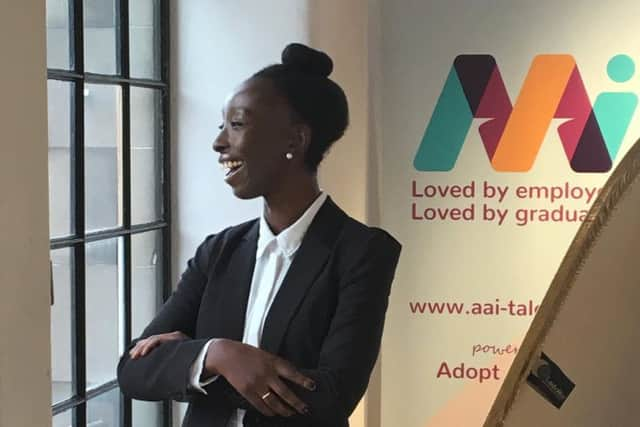The Big Interview: AAI EmployAbility founder Joy Lewis


In a year which has seen her not-for-profit recruitment business celebrate its 1,500th placement, Joy Lewis is still in contact with the very first intern she found paid work for nine years ago.
AAI EmployAbility, which began as a think tank programme to secure paid internships for university graduates, is evolving into a social enterprise powerhouse championing equality in the workplace. Formally known as Adopt An Intern, the recruiter rebranded last month to better reflect the wider range of job seekers it now supports. The Edinburgh business, now self-sustaining after receiving backing from the Scottish Government in its formative years, places candidates of all ages, skill sets and backgrounds. Its mission has matured beyond levelling the playing field for interns to driving inclusive, diverse hiring practices across start-ups, charities, large corporations and the public sector.
Advertisement
Hide AdAdvertisement
Hide Ad“Recruitment is often seen as a dirty word,” says Lewis. “But as a socially driven business we’ve always put the people first: the employers and the graduates. I spend a lot of my time, as do my team, giving hope to graduates who’ve lost it. There’s good reason for them to remain positive.”


AAI has a client list of more than 1,000 employers, with a 97 per cent successful placement rate, and boasts 73 per cent repeat business. Its patrons include Scots supermodel Eunice Olumide, who last year helped to launch Diversity Works, a project designed to unite potential employers, policymakers and community leaders with black, minority and ethnic women to highlight the need for more inclusive hiring processes. This is one of three social initiatives, along with Disabling Barriers – a project to raise awareness of candidates with disabilities – and Graduating Communities, which seeks to boost corporate social responsibility while helping third sector organisation become more sustainable.
'We simply ensure equality of opportunity'
After 20 years in the Foreign Office, including several postings abroad, and running a business mentoring and training saleswomen in the retail industry in Scotland and Germany, multi-lingual Lewis began working for the Centre for Scottish Public Policy (CSPP), an independent think tank, more than a decade ago. There she witnessed the “desperation” of graduates seeking work experience, and their willingness to take on unpaid positions to further their chances. In 2009, supported by introductions from the CSPP, she set up a programme to help ensure that graduates, regardless of their background or economic status, could gain paid experience as interns.
Three years later Lewis spun AAI out as a social enterprise. Today, the statistic she is most proud of is that 35 per cent of AAI applicants are the first in their family to go to university, which generally means that they can’t rely on “the bank of mum and dad” or on family networks to help them on their career ladder. As she puts is: “What we do is simply ensuring equality of opportunity.”
Advertisement
Hide AdAdvertisement
Hide AdLewis, who had not worked in recruitment prior to leading the paid internship project, recalls how the companies she approached initially were “fascinated” by what she was trying to do: “They were throwing money at me saying, I want an intern now!” She took her proposal to the Scottish Government and secured investment to help her create paid positions in smaller organisations, funding the wages of charities and start-ups who couldn’t afford to pay their interns. AAI now relies on client fees, although it continues to be involved in certain projects with the government. Lewis built the team with graduates, taking on 16 interns throughout the nine years and “watching them fly”.
She says: “I was just very grateful for having had that start really and being able to create a reputation in that field. In 2012, we went out and became a social enterprise in our own right. And we had a lot of happy customers, who hadn’t been paying for our services up to then, said ‘yep we will now pay’. So it was a lucky start for us.”
With government funding for charity positions no longer an option, AAI has created Graduating Communities, an initiative designed to boost employee retention at private sector business and give charities access to skilled workers. AAI secures projects for corporate employees based in the third sector for their employees, giving staff and corporations the chance to make a difference, while monitoring their beneficial impact, something Lewis notes is increasingly important to the corporate world.
“Businesses and investors want to see tangible proof of a social impact. We’ve got a lot of experience in placing interns graduates into charities and monitoring them. So we know that productivity is improved, turnover is increased. We know that it saves them time and that the graduates bring money in and help them to become sustainable and I wanted to use this in a way that could also bring businesses into the picture.”
'Sought-after' diverse shortlists
Advertisement
Hide AdAdvertisement
Hide AdAAI is currently working with business owners to progress the project, and has plans to publicise this further in the coming months. Corporations are perhaps increasingly feeling the need to make themselves more appealing to potential new hires, as much maligned skills shortages plague some of Scotland’s fastest growing industries, such as technology.
Since its inception, AAI has organically attracted above-average proportion of applications from disabled graduates and minority ethnic people, says Lewis, and these marginalised groups are among the key focus for AAI. Between June 2018 and June 2019, 44 per cent of AAI’s applications to Stem (science, technology, engineering and mathematics)-related roles were from women.
Lewis adds: “With the economic situation as it is, our diverse shortlists are sought after by businesses who now understand that inclusion is more important than ever. As we go now into even more economic uncertainty, people need to look at home talent, and this talent is on our doorstep. I can’t personally help every individual, which is why I really need businesses to open up their minds and hearts to this.”
The Diversity Works venture to support recruitment of black and ethnic minority women has already received attention from industry titans such as Scotland’s biggest distiller Diageo and financial services group Mercer. The project is designed to give participating businesses actionable takeaways, with examples including how to make their websites more appealing to a wider range of applicants who may have not felt represented before.
Advertisement
Hide AdAdvertisement
Hide Ad“It’s helped them understand how to improve attraction of these very talented women,” says Lewis. “And we’ve all had lightbulb moments when these women were talking. Small firms may be new to this; large corporates maybe think they’ve already got it covered to a certain extent so we have to delve deeper into some of the issues. But every company is different and every single one that comes on our workshops learns something.”
Meanwhile Disabling Barriers, designed and led by a disabled member of Lewis’ own team, is an effort to raise awareness around the barriers to employment of people with additional needs, which could include those with physical disabilities or neurodiverse applicants, such as people with Aspergers. “We believe this is unique,” says Lewis. “My colleague has designed this himself based on his own experience of being a disabled graduate and although we specialise in graduates, this can equally apply to any disabled people and business looking to increase their diversity. It’s really getting in amongst the staff. And creating awareness from bottom to the top, so that disabled people are really contributing to the workforce, as they should be.”
AAI generally handles positions with an annual salary of up to or around £35,000, but this too could soon change as the business broadens it focus from graduates to reach out to those returning to work.
The company recorded revenues this year of just under £200,000 all which is reinvested in the business as part of its social enterprise model. Lewis “would like to see this figure double over the next 12 months” to support its diversity work. She also has southern expansion in her sights. AAI has a growing reputation across Scotland and is making inroad in London, with Lewis aiming to become active throughout the rest of the UK in coming years.
Advertisement
Hide AdAdvertisement
Hide AdShe believes AAI’s progress in Scotland can be replicated elsewhere, adding: “I hope that we’ve gone some way to confirming with businesses that graduates are not people are just going to take up a lot of time and energy and will need to be trained. That’s not the case. Most of them can start running immediately, and they bring money in quickly. So they pay for themselves in this end. This is the message I think that we are getting through. Opportunities are taken rather than given and that’s evidenced from our success story.”